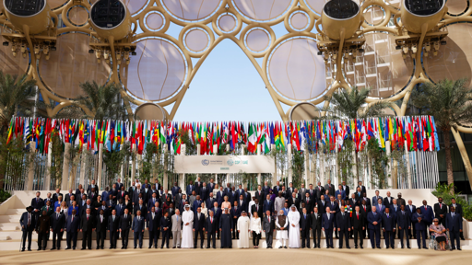
 KoreaTV.Radio -Issac Kim Intern Reporter | The 2023 United Nations Climate Change Conference, or COP28, concluded two days ago on December 12 in Dubai. There, at the heart of the global oil order, almost 200 nations approved a pact that, for the first time, called for “Transitioning away from fossil fuels in energy systems… accelerating action in this critical decade, so as to achieve net zero by 2050.” This marks the first time nations have explicitly mentioned “fossil fuels” in their agreement to combat climate change since they began meeting some three decades ago.
KoreaTV.Radio -Issac Kim Intern Reporter | The 2023 United Nations Climate Change Conference, or COP28, concluded two days ago on December 12 in Dubai. There, at the heart of the global oil order, almost 200 nations approved a pact that, for the first time, called for “Transitioning away from fossil fuels in energy systems… accelerating action in this critical decade, so as to achieve net zero by 2050.” This marks the first time nations have explicitly mentioned “fossil fuels” in their agreement to combat climate change since they began meeting some three decades ago.
Many were thrilled by the latest news, such as Wopke Hoekstra, the European commissioner for climate action, who declared that “Humanity has finally done what is long, long, long overdue.”
The President of COP28, Sultan Al Jaber, said that “We have delivered a robust action plan to keep 1.5C in reach [the target goal for global temperatures]... We have language on fossil fuel in our final agreement for the first time ever.” And Susana Muhamad, Colombia’s environmental minister, called the agreement “a strong political message that this is the pathway.”
Not all reactions, though, were positive. Critics have already pointed out that, as The New York Times writes, “The new deal is not legally binding and can’t, on its own, force any country to act.” The specter of the Paris Accords, which critics have similarly targeted as failing to have an impact on climate change, now seems to loom over COP28 as well. Notably, nations from the global south, especially those which are at most risk from climate change, such as island states threatened by flooding, raised concerns. Anne Rasmussen, the lead negotiator for the Alliance of Small Island States from Samoa, said that “the process has failed us… We have made an incremental advancement… when what we really needed is an exponential step change in our actions and support.”
Poorer nations from the developing world also raised concerns about the issue of financial support and obligations from richer countries; “The summit,” writes The Economist, “largely sidestepped this thorny issue. Developing countries with fossil-fuel reserves argued that it was unfair to expect them to forgo one of their few revenue streams without being given aid to do so… This provides the backdrop for a fierce battle.” Similarly, Diego Pacheco, the lead negotiator for Bolivia, said that “Developed countries say a great deal about ambition… But in the negotiation rooms of this conference they are… adding complexity to all the issues that are priorities for developing countries.”
Scientists have also argued that the deal does not go far enough. Indeed, the non-binding nature of COP28 is a reason for concern; since the plan relies on nations to individually implement it, it seems unlikely that massively emitting states, as well as petrostates which control the global oil flow, will be impacted by it. Indeed, “Saudi Arabia,” as the BBC reported, “which is in OPEC, said the texts agreed today ‘do not affect our exports, do not affect our ability to sell.’”
Especially contentious in the scientific community, though, is the phrasing of the text itself. The final agreement calls for a “Transitioning away from fossil fuels,” which is not as strong as and is more flexible than a call for a “phase-out”. The lack of language on a phase-out of fossil fuels, as described in an editorial from Nature, is not only “a missed opportunity,” but also “dangerous.”
“In the end,” the report continues, “the climate doesn’t care who emits greenhouse gases. There is only one viable path forward, and that is for everybody to phase out almost all fossil fuels as quickly as possible.” Individual scientists agree on this point as well: Prof. Michael Mann, a climatologist at the University of Pennsylvania, called “The lack of an agreement to phase out fossil fuels… devastating,” and Sir David King, chair of the Climate Crisis Advisory Group in the UK, called the wording of COP28 “feeble,” arguing that reaching the threshold of 1.5 degrees will require “total commitment to… full fossil fuel phase-out.”
Based on these judgements of the agreement, and considering the implications of previous climate deals, how can nations improve on and move forward from COP28?
Citations
https://unfccc.int/sites/default/files/resource/cma2023_L17_adv.pdf
https://www.nytimes.com/2023/12/13/climate/cop28-climate-agreement.html
https://www.theguardian.com/environment/2023/dec/13/cop28-landmark-deal-agreed-to-transition-away-from-fossil-fuels
https://www.theguardian.com/environment/2023/dec/14/failure-cop28-fossil-fuel-phase-out-devastating-say-scientists
https://www.economist.com/leaders/2023/12/13/in-a-first-cop28-targets-the-root-cause-of-climate-change
-------------
KoreaTV.Radio 김이삭 인턴 기자 | 2023년 유엔 기후변화 회의인 COP28은 지난 12월 12일 두바이에서 마무리되었다. 거기서 약 200개국은 전 세계적인 석유 질서의 중심지에서 "에너지 시스템에서의 화석 연료 전환을 가속화하여 2050년까지 순발력 달성"을 요구하는 팩트를 승인했다. 이는 기후변화와 싸우기 위해 국가들이 처음으로 "화석 연료"를 협정에서 명시한 것으로 30년 전통의 회의에서 이루어진 것이다.
이 소식에 기뻐하는 이들도 있었다. 유럽 기후 대응 위원인 Wopke Hoekstra는 "인류가 오래전에 해야 했던 일을 드디어 해냈다"고 선언했다. COP28 대표인 Sultan Al Jaber 대통령은 "1.5도를 유지하기 위한 강력한 행동 계획을 제시했다. 최종 합의에는 처음으로 화석 연료에 대한 언어가 들어갔다"며 자랑스러워했다. 콜롬비아 환경 장관인 Susana Muhamad는 이 협정을 "이것이 길"이라고 극찬했다.
그러나 모든 반응이 긍정적이진 않았다. 비판자들은 이미 "이 새로운 협정은 법적으로 구속력이 없고 어떤 국가에게도 행동을 강요할 수 없다"며 비판을 쏟아냈다. 파리 협정과 유사한 실패를 비판하는 이들에게 COP28도 그림자처럼 느껴진다. 특히 기후 변화로부터 가장 위험에 노출된 글로벌 사우스 국가들은 우려를 표명했다. 섬나라들은 홍수로 인한 위협에 직면하고 있는데, 이들 국가들은 "과정이 실패했다. 우리는 점진적인 진전을 이루었을 뿐, 우리가 필요한 것은 행동과 지원에서 급격한 전환"이라고 말했다.
개발도상국에서 온 나라들은 부자 국가들로부터의 재정 지원 및 의무 문제에 대해 우려를 표명했다. 경제학자들이 기술한 대로 "회의는 대부분 이 민감한 문제를 피했다. 화석 연료 보유 국가들은 소득 중 하나를 포기하는 것은 불공평하다고 주장했다. 이것이 치열한 전투의 배경이다." 또한 볼리비아의 주요 협상자 Diego Pacheco는 "선진국은 야심에 대해 많은 말을 하지만... 이 회의의 협상 방에서는... 개발도상국들의 우선 순위 문제에 복잡성을 더하고 있다"고 비판했다.
과학자들도 협정이 충분히 나아가지 않는다고 주장했다. COP28의 비결속성은 우려의 이유로 꼽히며 계획이 국가들이 개별적으로 실행해야 하기 때문에 대량 배출 국가와 세계 석유 유량을 통제하는 국가들에게는 영향을 미칠 것이 없다. 사우디 아라비아는 "오늘 합의된 텍스트가 수출에 영향을 주지 않고 판매 능력에 영향을 주지 않는다"고 주장했다.
과학계에서는 텍스트 자체의 표현이 논란이다. 최종 합의는 "화석 연료로부터의 전환"을 요구하지만, 이는 "단계적 폐기"에 비해 강도가 낮고 유연하다. 화석 연료 폐기에 대한 언어의 부재는 "놓친 기회뿐만 아니라 '위험한' 것"이기도 했다.
"결국," 보고서는 이 협정을 평가하며, 이전 기후 협정의 영향을 고려할 때, 국가들이 COP28에서 어떻게 발전하고 개선할 수 있는지를 생각해 볼 필요가 있다.

























